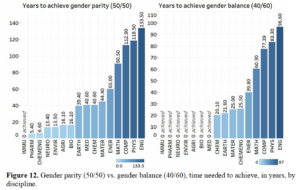A new study was published on January 17, 2024 in “Quantitative Science Studies”, a leading international journal, in Gold Access: “Young Male and Female Scientists: A Quantitative Exploratory Study of the Changing Demographics of the Global Scientific Workforce“ by Marek Kwiek and Lukasz Szymula
The paper in PDF (Gold Access) is here.
Marek Kwiek, Lukasz Szymula; Young male and female scientists: A quantitative exploratory study of the changing demographics of the global scientific workforce. Quantitative Science Studies 2024; doi: https://doi.org/10.1162/qss_a_00276
Abstract
In this study, the global scientific workforce is explored through large-scale, generational, cross-sectional, and longitudinal approaches. We examine 4.3 million nonoccasional scientists from 38 OECD countries publishing in 1990–2021. Our interest is in the changing distribution of young male and female scientists over time across 16 science, technology, engineering, mathematics, medicine (STEMM) disciplines. We unpack the details of the changing scientific workforce using age groups. Some disciplines are already numerically dominated by women, and the change is fast in some and slow in others. In one-third of disciplines, there are already more youngest female than male scientists. Across all disciplines combined, the majority of women are young women. And more than half of female scientists (55.02%) are located in medicine. The usefulness of global bibliometric data sources in analyzing the scientific workforce along gender, age, discipline, and time is tested. Traditional aggregated data about scientists in general hide a nuanced picture of the changing gender dynamics within and across disciplines and age groups. The limitations of bibliometric data sets are explored, and global studies are compared with national-level studies. The methodological choices and their implications are shown, and new opportunities for how to study scientists globally are discussed.



Bio
Professor Marek Kwiek is Director of the Institute for Advanced Studies and UNESCO Chair in Institutional Research and Higher Education Policy, University of Poznan, Poland (https://ias.amu.edu.pl/director/). His research area is quantitative studies of science, with interests in globalization, academic profession, and international research collaboration. He has published 230 papers and several books. His recent monograph is Changing European Academics: A Comparative Study of Social Stratification, Work Patterns and Research Productivity (Routledge, 2019). His recent invited seminars include Berkeley, Harvard, Stanford, Oxford, Beijing, Hiroshima, and Hong Kong. He spent three years at North American universities, including the University of Virginia and UC Berkeley. He was also a Fulbright New Century Scholar (2007-2008) and a Professorial Visiting Fellow at the UCL London (2012-2013). Currently, he is a Visiting Researcher at the German Center for Higher Education Research and Science Studies (DZHW, 2022-2024), Berlin. A Principal Investigator or country Team Leader in 25 international research projects. An associate editor of Higher Education. An editorial board member of Higher Education Quarterly and British Educational Research Journal. A Fellow of the European Academy of Sciences and Arts (EASA) in Salzburg and Academia Europaea in London. Elsevier and University of Stanford data name him among the top 2% of most highly cited scientists in the world. Contact: marek.kwiek@amu.edu.pl , Twitter: @Marek_Kwiek.


